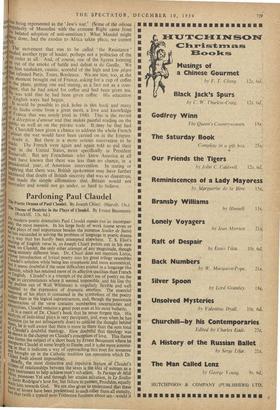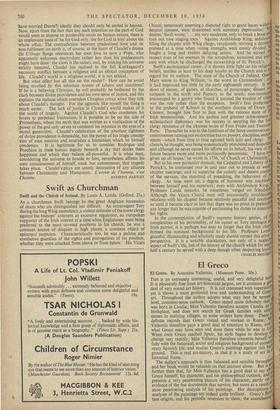Pardoning Paul Claudel . •
-e Poetic. Drama of Paul Claude]. ‘Ily Joseph Chiari. (Harvill. 15s.) a (,tockliff. 12s. 6d.) • (),!' modern poetic dramatists Paul Claudel stands out as incompar- • Lonely Voyagers ,..`" a Way that has hardly been attempted elsewhere. T. S. Eliot's • Raft of Despair ilitudel's solution while being less symphonic and more economical, Back Numbers 'Vanish, which has retained more of its affective qualities than French • (s4. English. Claudel's is a triumph of the direct usc of poetry on the • itilage in circumstances where it seemed impossible, and his line (by Zanted to the expression of dramatic emotion. The essential • meaning of his plays is contained in the symbolism of the poetry • .4.. Mer than in the logical suprastructure, and, though the passionate Unsolved Mysteries absurdities of the verse contains numberless uncertainties and • ., It is a merit of Dr. Chiari's book that he never forgets this. His • 41141Ysis of individual plays is very percipient, and, even when he has r„„InPares Claude] at some length to Dante, and it is the more interest- • In that it indicates a way of approaching this poet for someone have worried Dante?) ideally they should only be united in heaven. Now, apart from the fact that any such intention on the part of God would seem to impose an intolerable strain on human nature, there is an unpleasant taste of' he for God only, she for God in him' about the whole affair. The contradiction between predestined love and its non-fulfilment on earth is, of course, at the heart of Claudel's drama (in L'Otage Synge renounces her own love to save a Pope, who apparently welcomes martyrdom rather less than his predecessors might have done: the clash is the same), and, by making his universe strictly immoral, Claudel has realised to the full Kierkegaard's necessary conflict between a religious and an ethical conception of life. Claudel's world is a religious world; it is not ethical.
But what effect has all this on the reader? How can he avoid being revolted by this inhuman system of taboos and sanctions? If he is a believing Christian, he will probably be bothered by the clash between divine providence and his own sense of justice, and this explains the malaise which overtakes Christian critics when they talk about Claudel's thought. For the agnostic like myself the thing is much easier. The lack of justice in Claudel's world makes of it the world of tragedy. Against Claudel's God who condemns his lovers to perpetual frustration, it is possible to be on the side of Prometheus, where the myth that was written as a vindication of the Power of the god only serves to condemn his injustice in the eyes of a moral generation. Claudel's celebration of the absolute rightness , of divine providence is detestable, but the power of his tragic concep- tion of man sustains and nourishes a humanism which he himself condemns. It is legitimate for us to consider Rodrigue and Prouheze in their human dignity beneath a sky that denies them happiness and which they believe all-powerful. It is when man, Considering the universe as hostile to him, nevertheless affirms his own consciousness of himself, weak but autonomous, that tragedy takes place. Claudel's plays are utterly destructive of any alliance between Christianity and Humanism. L'avenir de l'homme, c'est









































 Previous page
Previous page